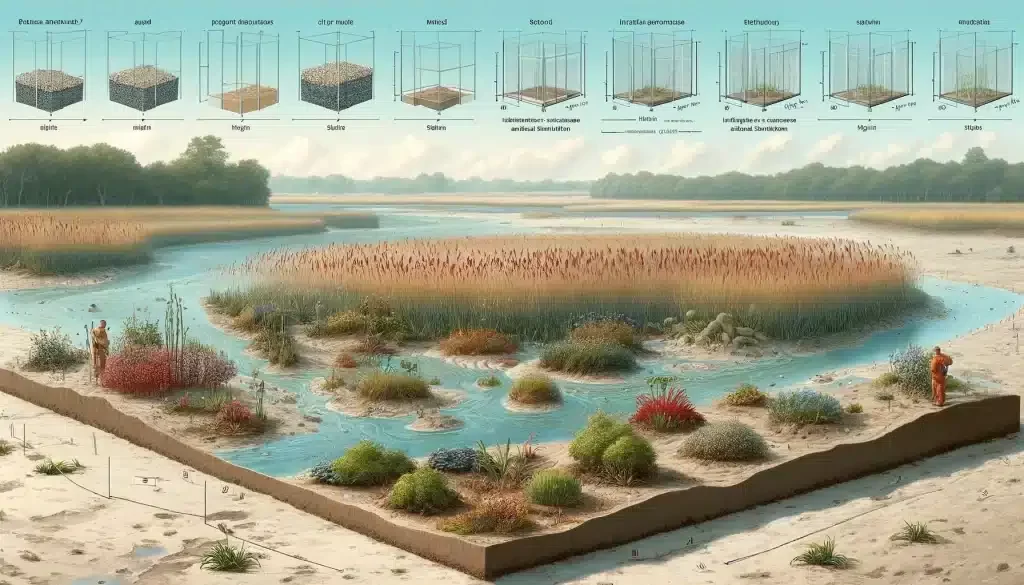Effects Of Different Soil Textures And Siltation Depths On The Growth And Reproduction Of Spartina
Exploring how soil texture and sedimentation depth affect Spartina Anglica growth in wetlands, aiding in invasive species management and ecosystem balance.
The soil texture and sedimentation depth in the salt marsh wetland ecosystem will change accordingly due to the synergistic effects of tides and organisms, which will affect the growth of individual plants and the distribution of wetland vegetation. This article uses intelligent greenhouse artificial simulation to control soil texture and siltation depth experiments, and analyzes different soil textures (clay and mixed soil) and siltation depths (no siltation, siltation plant height 1/4, siltation plant height 1/2 and siltation plant height 3 /4) Impact on the growth and reproduction characteristics and biomass accumulation of the exotic clone plant Spartina anglica population. The results show that clay promotes the increase in leaf area, number of leaves and rhizomes, and increases the total length of rhizomes, rhizome biomass and accumulation of aboveground biomass; while mixed soil (the volume ratio of clay to sand is 1:1 ) increased the number of cloned ramets, total biomass, underground biomass and root biomass. Except for leaf area, which reached the maximum value under the treatment of 3/4 of the siltation plant height, other indicators reached the maximum value under the treatment of 1/2 of the siltation plant height. It can be inferred that the more suitable soil texture and sedimentation depth for Spartina populatus is 1/2 of the plant height in clay sedimentation. It is speculated that corresponding biological and engineering measures can be used to improve the soil texture and change the sedimentation depth to effectively manage the distribution of Spartina in my country’s coastal zones, which provides a theory for controlling the invasion and population expansion of Spartina in coastal salt marshes. in accordance with
Study Rationale on Spartina Anglica’s Growth Factors
The ecological balance and biodiversity of salt marsh wetlands are significantly influenced by various environmental factors, among which soil texture and sedimentation depth play a pivotal role. These factors not only affect the physicochemical properties of the soil but also its interaction with tidal activities and living organisms, thereby influencing the vegetation distribution and individual plant growth within these ecosystems. This study delves into the synergistic effects of soil texture and sedimentation depth on the growth, reproductive characteristics, and biomass accumulation of the exotic clonal plant Spartina anglica, utilizing intelligent greenhouse artificial simulations to meticulously control experimental conditions.
Research Methodology and Experimental Design
Spartina anglica, a species introduced to coastal zones, has shown significant ecological adaptability and potential for invasive spread, making the understanding of its growth dynamics crucial for wetland management. The research conducted focused on two primary variables: soil texture (categorized into clay and mixed soil) and sedimentation depth (examined at various levels: no siltation, siltation at plant height 1/4, 1/2, and 3/4). These conditions were meticulously replicated in a controlled environment to observe their impact on Spartina anglica’s vegetative growth and biomass development.
Impact of Soil Texture on Plant Development
The findings revealed distinct responses of Spartina anglica to different soil textures. Clay was found to enhance the growth metrics significantly, such as leaf area, number of leaves, and the development of rhizomes, which are crucial for the plant’s asexual reproduction. It notably increased the total length of rhizomes, rhizome biomass, and the accumulation of aboveground biomass, indicating a favorable condition for its proliferation. Conversely, mixed soil, with an equal volume ratio of clay to sand, was conducive to the increase in the number of cloned ramets, total biomass, and specifically underground biomass including roots, suggesting different growth advantages in varied soil compositions.
Influence of Sedimentation Depth on Growth Metrics
The study also highlighted the critical role of sedimentation depth in Spartina anglica’s development. While leaf area peaked with siltation at 3/4 of the plant height, other vital growth indicators, such as the number of leaves, rhizome length, and biomass accumulation, achieved optimal levels with siltation at 1/2 of the plant height. This suggests a complex interaction between sedimentation depth and plant growth, where moderate siltation depth appears to provide the most beneficial conditions for Spartina anglica’s expansion.
Implications for Wetland Management and Invasive Species Control
These insights are invaluable for ecological management and the formulation of strategies aimed at controlling the spread of Spartina anglica in China’s coastal zones. The study proposes that through targeted biological and engineering interventions, it is possible to manipulate soil texture and modify sedimentation depth to mitigate the invasive expansion of Spartina anglica. This research not only contributes to our understanding of the ecological dynamics of salt marsh wetlands but also offers a theoretical basis for the effective management and control of invasive species in such ecosystems. By embracing a comprehensive approach that considers the intricate interactions between soil, sedimentation, and plant life, we can safeguard the ecological integrity and biodiversity of salt marsh wetlands.
For futher details of this article and research, feel free to contact our team for assistance.
Original research was done by Liu Lin, An Shuqing, Zhang Mingxiang, Zhi Yingbiao, Li Hongli
About ETprotein:
ETprotein, a reputable plant protein vegan protein Chinese factory manufacturer and supplier, is renowned for producing, stocking, exporting, and delivering the highest quality organic bulk vegan protein and plant proteins. They include Organic rice protein, clear rice protein, pea protein, clear pea protein, oat protein, watermelon seed protein, pumpkin seed protein, sunflower seed protein, mung bean protein, peanut protein, various of plant peptides etc. Their offerings, characterized by a neutral taste, non-GMO, allergen-free attributes, cater to a diverse range of industries. They serve nutraceutical, pharmaceutical, cosmeceutical, veterinary, as well as food and beverage finished product distributors, traders, and manufacturers across Europe, USA, Canada, Australia, Thailand, Japan, Korea, Brazil, and Chile, among others.
ETprotein specialization includes exporting and delivering tailor-made protein powder and finished nutritional supplements. Their extensive product range covers sectors like Food and Beverage, Sports Nutrition, Weight Management, Dietary Supplements, Health and Wellness Products, and Infant Formula, ensuring comprehensive solutions to meet all your protein needs.
As a trusted company by leading global food and beverage brands and Fortune 500 companies, ETprotein reinforces China’s reputation in the global arena. For more information or to get a free sample of their protein products, please contact them and email sales(at)ETprotein.com today.












